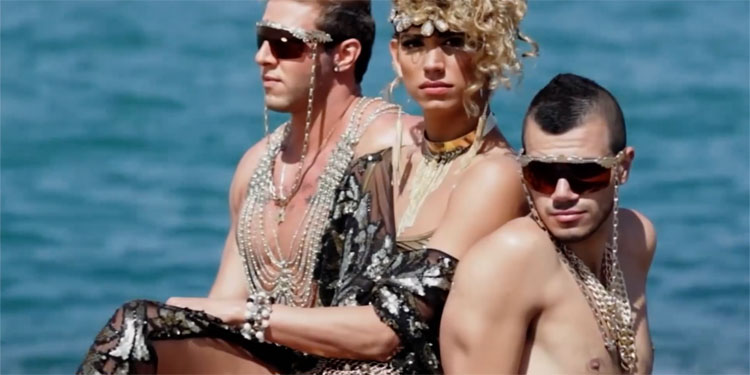
Director: Lisa Morgenthau
Running Time: 74 mins
Certificate: NR
Release Date: November 7th (UK Jewish Film Festival Screening)

Israel is a complicated country – and that’s a bit of an understatement. Looking at it from the outside, it’s difficult not to see the divisions and intractable conflicts, the secular butting up against very conservative religion, and also that against that backdrop, Tel Aviv holds one of the biggest gay pride parades on the planet.
British filmmaker Lisa Morgenthau’s documentary, A Queer Country, looks at Israel from an LGBT perspective. Initially it feels like it’s going to be an advert for the Tel Aviv Tourist Board, much like Michael Lucas’ Undressing Israel a couple of years ago. However, thankfully it then starts engaging with some of the more interesting and thought-provoking issues queer people in Israel face. For example, the film contrasts the largely secular and open Tel Aviv with the more buttoned down Jerusalem, where gay issues are far more political and difference less tolerated.
It also looks at those who’ve faced difficulties due to the fact Ultra-Orthodox Jewish communities rarely accept LGBT people, and who have therefore had to find new ways to honour their beliefs outside the tight-knit world they were once part of. The film also addresses the accusations of pinkwashing that have been levelled against Israel – specifically allegations that the Foreign Ministry has promoted the country’s acceptance of LGBT people to try and deflect criticism from allegations of human rights abuses against Palestinians.
With these and various other issues, the film does a pretty good job of avoiding pushing an agenda, while giving voice to a variety of people who show that things are often far more complicated than they first appear. For example, with pinkwashing, is it a cynical attempt to gloss over the fact not all minorities enjoy the benefits LGBT people do, or is it a legitimate way of promoting a nation that often finds it difficult to get positive stories on the international stage?
Similarly, while in the early part of the film many participants talk about how Tel Aviv is a gay haven and joke that it’s straight-friendly, it was also the scene of a 2009 shooting at a gay centre that killed two and injured 15 others, while in 2015 Jerusalem Pride saw a fatal stabbing by an Ultra-Orthodox Jew angry the city had allowed the celebration. Some of the most interesting parts of the film are when it looks at the dichotomy of a country set up to be a secular, plural society, but where that plurality means they have to try and find ways for some very different and sometimes extreme views to live alongside one another.
A Queer Country tries not to draw any conclusions, instead presenting a variety of thoughts and opinions. One thing that does seem glaringly missing though is the perspective of LGBT Arabs in Israel, as while the movie engages with the Israeli-Palestinian conflict and how that relates to LGBT people, it does so almost exclusively from one side of the divide. It means that some people, perhaps unfairly, will feel the film is rather one-sided. However, while the film may only include voices from one side of the conflict, it does a good job of include a diverse array of interviewees from within the Israeli Jewish community, from a strict orthodox ‘psychologist’ who thinks everything gay is wrong, to gay Jews conflicted about their status compared to Palestinians, to a trans man and his family on a kibbutz where they’re trying to live their lives in a way they feel honours God, although others may disagree.
Indeed, one theme that pops up time and again, is people trying to find synthesis between being gay and Jewish, something many people, and perhaps Israel as a nation, is still trying to deal with. Indeed, it’s an issue that seems to go wider than just LGBT issues, such as when one person talks about the fact religious bodies have complete control over marriage in the country, meaning it’s not just gay people who can’t marry, but also many of those who fall in love with people outside their own religion or denomination.
Those outside Israel are likely to find A Queer Country pretty interesting, as it helps puts context on issues that are often presented in rather one-dimensional ways. It shows that, as is so often is the way, things are more complex than they first appear, and that while Israel may be the most gay-friendly country in the middle-east, LGBT people still face difficulties that are both relatable and very specific to living in that country, and that even within Israel there is division about how their status relates to other groups.
Overall Verdict: An interesting look at the complex issues surrounding LGBT people in Israel, from pinkwashing and conflicts with orthodox Jewish sects, to the threat of violence and very different attitudes in different parts of the country.
Reviewer: Tim Isaac
The UK International Jewish Film Festival takes place in London and various other cities across the UK on 5th – 20th November. A Queer Country screens on November 7th.
Leave a Reply (if comment does not appear immediately, it may have been held for moderation)